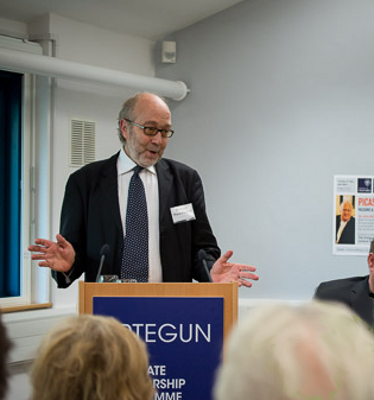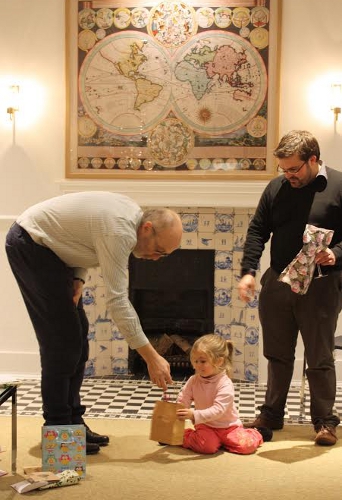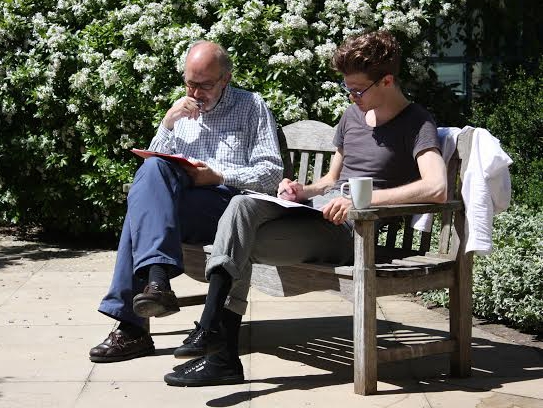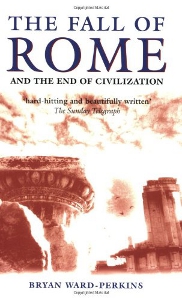- Why Did The Roman Empire Fall? A Top Scholar From Oxford Shares His Thoughts
- Why Did The Christians Change The Meaning Of The Logos From “Reason” to “The Word of God”?
- How Is Roman Pottery Used to Evaluate Stages Of The Roman Empire?
Full Interview Audio

Personal Info
Hobbies and Interests:Travelling to look at buildings and works of art
Favourite Books:
- Oliver Twist by Charles Dickens
- A Tale of Two Cities by Charles Dickens
- The Golden Compass by Philip Pullman
- The Subtle Knife by Philip Pullman
Most Influenced By: His wife, Karl Leyser (undergraduate professor)
Company Website: http://www.trinity.ox.ac.uk/pages/the-college/staff/bryan-ward-perkins.php
Interview Highlights
This is a condensed, lightly edited transcript of an audio interview. The full audio is available and highly recommended. The interviewee may post clarifications in the comments.
Adrian Bye: Today I’m here with Bryan Ward-Perkins who is at Oxford. Bryan is a specialist in the topic of the Roman Empire and the reason why it fell and the archeology around it. Bryan, thanks for joining us.
Bryan Ward-Perkins: It’s a great pleasure.
Adrian Bye: Could you tell us a little bit about your background, who you are and how you got to where you are now?
Bryan Ward-Perkins: The most important thing is I was born in Rome, the center of the Roman Empire.
Adrian Bye: So you are actually Roman?
Bryan Ward-Perkins: Yes, a Roman by birth. My dad was a classical archeologist, a distinguished classical Roman archeologist who wrote a very good book on Roman architecture. I was exposed to things Roman from a very early age. I actually got into it at a slightly later period than my dad was interested in, namely the early Middle Ages and the transition from Rome to a later period. Academically, I studied history, but I always worked partly as an archeologist. So I’ve always been very interested in things as well as texts. I kind of combine a perspective that looks at material and textual evidence. Luckily I have a job in Oxford teaching in the history faculty, and the history faculty allows one to be very broad-minded in terms of what exactly one teaches.
Adrian Bye: In your book you talk about when you were a kid that you guys dug up so much Roman pottery that you just went and threw it away in the river.
Bryan Ward-Perkins: That was actually my dad’s work. I was brought up in a place called the British School of Rome, which is an academic institution with archeologists and artists there. He ran what’s called a field survey, which involved going out to the countryside, walking over ploughed fields and picking up bits of Roman pottery. And you found where there was a villa, or a peasant dwelling, there was always Roman pottery. You could pick it up, chart it on a map, and you could date the settlement from the types of pot used. But that produced tons and tons of pottery, and that obviously creates a storage problem. The reason it was dumped into a river was that if anybody finding it later in that river would think it could have come from anywhere and washed downstream. So it wouldn’t infuse the archeological record. Whereas if you put it in a field, people would suddenly get very excited and think that was a major Roman site where they’d found it.

Adrian Bye: I’ve been to Italy, but I haven’t been to Rome. I wasn’t familiar at all with the Roman Empire. Just recently I went to the Metropolitan Museum of Art here in New York City that has a big exhibit on the Greek and Roman Empires. It made it a lot more real to see everything there. As a person who hasn’t been exposed to any of this you think that this is old stuff that doesn’t really have any relevance today.
Bryan Ward-Perkins: What is striking about the Roman world in particular, and to some extent the Greek world of the first three centuries A.D., is the scale of economic activity and the reach of economic activity. What’s so striking about the Roman world is that they are making very ordinary things. Pottery is a splendid index of that because it is a very ordinary type of object and never hugely expensive. To make money out of making pottery you have to make it in large quantities and to a very high quality, to a very standardized form and then diffusing it widely. Not just geographically. There were workshops in North Africa in the third and fourth century which were sending material all over the Mediterranean, some of which even reach Britain at that date. But they are also diffusing it socially, so not just people in lead nor just people in towns have it. It actually gets right out to the countryside, to quite low level rural settlements where people we would describe as peasants were actually using imported high quality Roman pottery.
Adrian Bye: So they got quite a system set up. One of the things that struck me from your book is that it felt quite right wing. That’s at least the message I got from it.
Bryan Ward-Perkins: That’s a fair comment. I’m certainly not right wing. I agree, it is about markets and the power of markets. But there is the sting in the tail in the book which is about the danger of over-dependence on such things. I certainly didn’t write it with a political agenda, I wrote it because I know about the material evidence, and a lot of people writing about this period just look at texts.
Adrian Bye: You wrote the book almost ten years ago. How are your views now on the influence of Christianity and the decline? I got the impression that there were a lot of influences that caused it to fall. And it didn’t seem necessarily that they had a sustainable economy. I got the impression a lot of the economy of the Romans was built around acquisition of enemy stuff.
Bryan Ward-Perkins: I don’t actually think the Roman economy did require constant expansion. There is absolutely no doubt at all that in its period of expansion it did extremely well. But by 300 A.D. it had stopped expanding for already 300 years. It had settled down to being an essentially rather effective internal market with a single coinage, no trade barriers, a peaceful Mediterranean with no reason to interrupt trade in the Mediterranean. And to go back to my political views, one thing that I hoped would come out of my book is an interest in ordinary produces and merchants, and people moving stuff being important just as much as the elites of society are important. I think the Roman economy was an effective, efficient machine. It was very specialized. It is an economy that’s based on all the domestic activity and on an elite level on slaves. And a huge slave trade.

Adrian Bye: We know in academia, and you are probably more familiar with this than I am, there are a number of topics that aren’t really supposed to be researched. Essentially in some areas and particularly about gender and race, we have decided as a society not to research these topics based on reason. I actually got quite interested in stoicism. In stoicism they talk about the logos, or nature, which is the concept of the world being based on reason. A really interesting thing I came across is that when Christianity came along they defined the logos as the Word of God. So prior to Christianity the logos, the final word was based on reason. When Christianity came along it was based on the Word of God. Now, our level of reason is much more advanced than it was two thousand years ago, but we still have areas in academia which are not based on reason, and for obvious reasons. I can give you a very uncomfortable topic, that’s race and IQ. That’s a topic we are not allowed to discuss, that’s essentially banned.
Bryan Ward-Perkins: I suppose I would have said that probably all societies in all periods have the unthought, often unsuspected boundaries, and also the unthought, totally unsuspected prejudices which they can’t really detect themselves. If one looks back at our own society just a hundred years ago, we probably believed that women were deeply inferior, weren’t really competent to have the vote. We’d also assume that the British had a god-given right to rule over inferior peoples. I do agree, there is an interesting contrast between the Greek and Roman world and the immediate post-Greek and Roman world with the rise of what we would think of as fundamentalist religious belief. Which to many of us is much less attractive than the Greek or Roman world. I myself find many of the early Christian writers, who at their worst are profoundly fundamentalist and deeply prejudiced against other religions, very unattractive.
Adrian Bye: Since the book has been published, have your thoughts and views on what you wrote changed?
Bryan Ward-Perkins: Not enormously. I think it’s hard to dispute the overall economic message, which is of dramatic change at the end of the Roman world. The thing I like to emphasize is one way of looking at the end of the Roman world is from the material perspective, which I personally think is extremely important. But you can look at the period as a period of dynamic, very interesting change, particularly religious change. Key obviously is the rise of Christianity. In 312, the emperor Constantine happens to be a Christian, by good luck or perhaps will of God, he conquers the whole Roman world, sets up a Christian dynasty. The Roman Empire becomes Christian, which is a massively important change. The whole future, intellectual shape of the western world is determined by that change. There is no denying it is important. And then, third century, out of Arabia, where nobody expected anything ever to come, suddenly emerges a new religion, and an army which conquers the whole Persian Empire, the east Roman Empire, and sets up Islam. So it’s a period with huge dynamic, vastly interesting changes. I was wanting to focus on a different story, which I would define was the end of a civilization, but in very material terms.
Adrian Bye: I want to come back to this thing of the logos. Stoicism is a philosophy built on reason. We know that the Romans weren’t always terribly nice people, and certainly didn’t treat, should we say the unworthy masses, particularly well. I get the feeling that Christianity was sort of a way to take control. When you move away from reason to faith, that becomes a way of disempowering the Romans that are running everything. Do you have any thoughts on that?
Bryan Ward-Perkins: In theory, a switch to Christian values would be a switch away from a lead, in the sense that everybody can have faith. You don’t need to be philosophically trained to have it. In theory at least, Christianity favors the downtrodden. In practice it didn’t quite work out that way, unfortunately. The downtrodden became the recipients of charity, but it was always charity which the elite was using in order to display its wealth. Charity wasn’t really focused on the poor, it was focused on the elites in that they give away money in order to get to have them. And equally, the most striking thing is Christianity didn’t mean people stopped killing each other. Turning the other cheek and loving thy enemy never really functioned. In fact, they looked back to the example of the Old Testament where the God of Israel positively encourages you to slaughter your enemies in the name of God. That was a dreadful discovery; the discovery that you could actually kill people as a religious activity.
Adrian Bye: I mentioned I’m a big fan of stoicism, it’s helped me a lot personally. A lot of stoicism material got destroyed. A friend said that the reason why we have that much material left from stoicism today is because the Arabs kept it.
Bryan Ward-Perkins: Oh, that’s certainly true. And incidentally I’m just thinking about what you were saying about the contrast of the world of the philosophers and the world of the Christians. You are right, there is a big shift. It’s an interesting shift, though, because the world of the philosophers is a world of a very small elite who have studied that stuff, can read Greek, and actually have leisure. None of these people work. They were all sitting there, thinking and feeling, and feeling good. But it only works at the very top levels of society. In no way does that permeate any further down. So if you wanted to look positively at the impact of Christianity, Christianity was a religion that involved a much wider section of society. In fact, elite paganism as well was an essentially elite religion. There were popular forms of it, people going to rural shrines and things like that, but it wasn’t really much involvement for a wider part of society.

Adrian Bye: You are talking about philosophy?
Bryan Ward-Perkins: Yeah, particularly philosophy, but even just the traditional civic paganism that you do in a town. It was very much about the reinforcing of the position of the elite in the town. Christianity was a religion that involved people. There is a big difference in pagan temples where you always got a very small space where the statue of the god was and where only ever a few people got access to, and Christian churches that were always designed to bring vast people into them. One might, or might not, find that attractive. In a way it’s about a shift to a more demotic fundamentalist stir-up-the-crowds type religion which I don’t find terribly attractive. But one has to accept for a fact that it did involve more people, whereas your stoic position is a very elite one.
Adrian Bye: One of the things that is interesting to me is that Paul, the Apostle, if he wasn’t involved in stoicism, he was certainly around it a lot. And it seems that he included a lot of stoicism in Christianity.
Bryan Ward-Perkins: That wouldn’t surprise me. There obviously is a powerful influence. Christianity wasn’t immune. I’m certain the Christians of the third and fourth century were highly educated people who’d imbued Greek or Roman culture and therefore inevitably took into the new Christian culture a lot of what they’d taken from the pre-Christian past. Nobody stopped reading the pre-Christian material. They might be hesitant about the religious message of it, but they went on reading it. It’s undeniable that up until the fourth, fifth century, people wrote things that are self-reflexive. Actually, Christians as well, because ‘Augustine’s Confessions’ is a remarkable book. It’s a very readable account of his own conversion and his move towards Christianity. It’s an intelligent, interesting self-analytical work. We immediately identify much more readily with the literature of the Greek and Roman world, and the thinking of the Greek and Roman world; largely because it’s got people actually thinking about where they are in the world and where they stand. And that just stops at the end of the Roman world.
Adrian Bye: So, moving on to 2013, are we going to fall like the Roman Empire did?
Bryan Ward-Perkins: I very much hope not. My book ends with a moral, which is to tell the modern world that there is a danger of terrible collapse. The Roman world was so sophisticated and so complex that it consisted of lots of people in distant complex economic relationships, which created the widespread prosperity of the Roman world. But precisely because it was so sophisticated, when it collapsed, the collapse was so total. Instead of having people who knew how to make pottery locally, they were buying it from hundreds of kilometers away. When those markets collapsed, they didn’t know how to do it anymore. They weren’t able to recreate local markets. Obviously what happened at the end of the Roman world is nothing to what would happen to our world were our economic complexity to collapse. 2008 did reveal some of the dangers. Fortunately, 2008 in comparison to the end of the Roman world is a mere tiny economic blip, but it did sort of reveal how the extreme complexity that we got ourselves into has its dangers, as well as its benefits. No, I don’t think we are necessarily headed for disaster, but what I do think is that we are walking along a tightrope of complex prosperity, which we need to look after carefully.
Adrian Bye: I think that’s a very good way of saying it. Bryan, thank you very much for doing the interview.
Bryan Ward-Perkins: Thank you, that’s a great pleasure.










